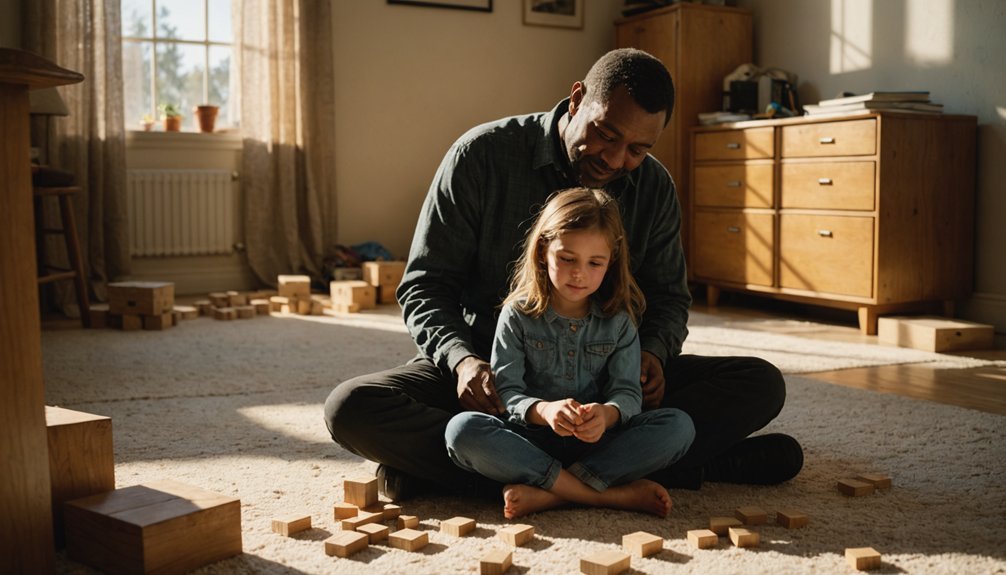When you're raising children in today's challenging world, you'll often find yourself torn between protecting them from harsh realities and preparing them to face those very challenges. Grace-based parenting offers a revitalizing alternative to authoritarian approaches, allowing you to guide your children with compassion while maintaining necessary boundaries. This mindset shift can transform your family dynamics, but it isn't always easy, especially if you've grown up with different parenting models. As external pressures mount and society's expectations weigh heavily on both parents and children, understanding how to implement grace-based principles becomes increasingly essential for your family's emotional wellbeing.
Key Takeaways
- Create a safe emotional environment at home where children can process external challenges through open dialogue and understanding.
- Model grace-filled responses to mistakes and challenges, showing children how to navigate difficulties with resilience and compassion.
- Build strong emotional connections through active listening and validation to help children withstand negative external influences.
- Establish clear, consistent boundaries that provide security while teaching children to make wise choices in challenging situations.
- Focus on heart-level conversations and emotional regulation skills rather than simply controlling external behavior.
Understanding Grace Based Parenting
Most parents want to raise emotionally healthy children, but traditional disciplinary approaches often fall short of achieving this goal. Grace parenting offers a revitalizing alternative that focuses on building strong relationships while maintaining healthy boundaries. You'll discover that this approach mirrors how a loving God parents His children – with patience, wisdom, and unconditional love.
At its core, grace parenting recognizes that children aren't miniature adults but growing individuals who need guidance and understanding. You're not lowering your standards when you choose this path; instead, you're creating a safe space where your children can learn from their mistakes without fear of rejection.
Research shows that children raised in grace-based homes develop stronger emotional resilience and better decision-making skills.
When you practice grace parenting, you'll respond to challenging behaviors by addressing the heart issues rather than just the external actions. This means you'll connect before you correct, listen before you lecture, and guide before you judge.
You're building a foundation of trust that will serve your relationship well into your children's adult years, while still maintaining appropriate boundaries and expectations.
Setting Loving Boundaries

When you establish loving boundaries for your children, you're actually showing them one of the deepest forms of parental care by creating a secure environment where they can thrive.
Your consistent enforcement of clear, age-appropriate rules helps your kids develop a strong sense of security and predictability in their daily lives.
Research shows that children who grow up with well-defined boundaries and expectations are more likely to build trust in their parents and develop better self-regulation skills.
Boundaries Show Kids Love
Parents who set clear, consistent boundaries demonstrate profound love for their children, even when it doesn't feel that way in the moment. Boundary importance isn't just about control – it's a fundamental love expression that creates security and stability in your child's world. When you establish and maintain healthy limits, you're showing your kids that you care enough to guide them safely through life's challenges.
| Boundary Type | Shows Love By | Child's Benefit |
|---|---|---|
| Screen Time | Protecting Mental Health | Better Sleep/Focus |
| House Rules | Teaching Responsibility | Life Skills Growth |
| Social Limits | Ensuring Safety | Healthy Relationships |
| Academic Goals | Supporting Success | Self-Discipline |
| Behavioral Guidelines | Building Character | Emotional Intelligence |
Your children may push back against boundaries, but that resistance actually signals they're working. Kids test limits precisely because they need to know you'll hold firm in your love for them. By maintaining consistent boundaries, you're creating a secure foundation where they can explore, grow, and develop confidence. Remember, every time you lovingly enforce a boundary, you're investing in your child's future emotional well-being and success.
Clear Rules Build Trust
Establishing clear, consistent rules creates a foundation of trust between parents and children. When you set clear expectations and follow through consistently, your kids learn they can rely on your word and predict outcomes. This predictability helps them feel secure and builds mutual respect in your relationship.
You'll find that children thrive when they understand the boundaries. Rather than viewing rules as restrictions, frame them as guidelines that keep everyone safe and help the family function smoothly. Be specific about what you expect – instead of saying "be good," explain exactly what that means, like "speak kindly to your siblings" or "complete homework before screen time."
Remember to adjust rules as your children grow and demonstrate responsibility. When they understand the "why" behind your expectations, they're more likely to cooperate willingly.
Research shows that children raised with clear, age-appropriate boundaries develop better self-regulation skills and stronger family bonds. By maintaining consistent rules while showing grace when mistakes happen, you're teaching your children that they can trust both your firmness and your love.
Connection Before Correction

When your child misbehaves, your first instinct might be to correct or discipline, but research shows that connecting emotionally before addressing behavior leads to better outcomes.
You'll build more trust and achieve greater cooperation by first listening with empathy and offering a safe emotional space through "time-in" approaches rather than isolating punishments.
This connection-first approach helps your child feel secure enough to learn from mistakes and creates a foundation of trust that makes future teaching moments more effective.
Build Trust Before Teaching
A child's heart opens most readily to those they trust. Before you can effectively teach or guide your children, you'll need to establish a foundation of trust through consistent, caring interactions. Research shows that children learn best when they feel emotionally safe and connected to their teachers – and this applies even more strongly to parents.
Trust building isn't complicated, but it requires intentionality. Start by being fully present during daily interactions, maintaining eye contact, and showing genuine interest in your child's thoughts and feelings. When you make mistakes, apologize sincerely – this models accountability and reinforces that you're trustworthy even when imperfect.
Your teaching strategies will be far more effective once you've established trust. Children are more likely to listen, share their struggles, and internalize your guidance when they know you're in their corner.
Create opportunities for open dialogue without judgment, and celebrate their efforts rather than just outcomes. Remember that trust isn't built in grand gestures but in small, repeated moments of reliability and emotional availability.
When children feel secure in your relationship, they're more receptive to learning life's important lessons.
Listen With Open Arms
Building trust naturally leads to the power of active listening. When your child comes to you with concerns or stories, they're not just sharing information – they're offering you a glimpse into their world. By practicing active listening, you're showing them that their thoughts and feelings matter, creating a safe space where they feel valued and understood.
Your empathetic responses serve as a bridge between your child's experience and your guidance. Instead of immediately jumping to solutions or corrections, try reflecting their emotions: "That must have been really frustrating" or "I can see why you'd feel that way." This validation helps your child develop emotional intelligence and strengthens your connection.
Research shows that children who feel heard are more likely to seek parental guidance during challenging times. Put away your phone, maintain eye contact, and use encouraging phrases like "Tell me more" or "What happened next?"
When your child feels genuinely listened to, they're more receptive to guidance and more likely to open up about important issues. Remember, the goal isn't to fix everything – it's to create an environment where your child knows they can come to you without fear of judgment.
Time In, Not Out
Traditional time-outs may backfire by isolating children during moments they need connection most. When your child struggles with big emotions or challenging behaviors, they're actually signaling a need for emotional connection and guidance, not isolation.
Time in creates opportunities for co-regulation and learning through relationship. By sitting with your child during difficult moments, you're teaching them that they're not alone with their feelings and that you'll help them navigate tough situations.
| Instead of This | Try This |
|---|---|
| Sending to corner | Sitting together |
| Isolation | Connection |
| Punishment focus | Learning focus |
| Silent treatment | Open dialogue |
| Shame | Understanding |
Research shows that time in strengthens the parent-child bond while developing emotional intelligence and coping skills. When you stay present with your child during challenging moments, you're modeling emotional regulation and building trust. Your child learns they can come to you with difficult feelings without fear of rejection.
Navigating Mistakes With Compassion

Parents often struggle with their response when children make mistakes, but research shows that meeting these moments with compassion creates stronger emotional bonds and better learning outcomes.
When you respond with understanding rather than harsh criticism, you're teaching your child that mistakes are opportunities for growth, not sources of shame.
Practice mistake acceptance by acknowledging that errors are a natural part of learning and development. Instead of expressing disappointment or frustration, try saying, "I see what happened. Let's figure this out together."
This approach helps your child feel safe coming to you with problems rather than hiding them.
Compassionate correction involves guiding your child through the mistake while maintaining emotional connection. You'll want to validate their feelings first, then explore solutions together.
For example, if your child breaks something while playing, say, "I know you didn't mean to break it. These things happen. What can we do to fix it?"
This strategy helps develop problem-solving skills while preserving their sense of worth.
Remember that your response to their mistakes shapes how they'll handle future challenges. By modeling grace and understanding, you're teaching resilience and emotional intelligence.
Building Trust Through Grace

Through consistent grace-filled responses, you create an environment where trust naturally flourishes between parent and child. When you respond with understanding instead of harsh judgment, your children learn they can come to you with their struggles, fears, and failures.
This trust-building process develops gradually through countless small grace moments in daily interactions. Research shows that children who experience grace-based parenting develop stronger emotional security and are more likely to maintain open communication with their parents through adolescence.
You'll notice your child becomes more willing to share their challenges when they're confident you won't respond with criticism or punishment. Instead of hiding their mistakes, they'll seek your guidance and support.
To strengthen this trust, acknowledge your child's feelings before addressing their behavior. When they spill milk or break a rule, pause before reacting.
Your measured response in these grace moments teaches them that your love isn't conditional on their performance. Make it clear that while behaviors may have consequences, your relationship remains secure.
This approach creates a foundation of trust that will serve both you and your child throughout their development.
Breaking Generational Parenting Patterns

Cycles of harsh parenting often perpetuate across generations until someone consciously decides to change course. When you've experienced generational trauma, it's natural to find yourself repeating familiar parenting styles, even when you've promised yourself you'd parent differently.
Breaking cycles requires both awareness and intentional action.
Start by examining your family dynamics through reflective practices. Notice when your reactions mirror those of your parents, and pause to reflect on alternative responses. You'll find that mindful parenting creates space between trigger and response, allowing you to choose gentler approaches.
Building emotional resilience in yourself is essential for implementing change. You can't give what you haven't received, so invest in your own healing journey. Explore therapy, join support groups, or engage with resources that help you understand and process your past experiences.
Replace harsh disciplinary methods with positive reinforcement techniques. When you catch yourself slipping into old patterns, don't self-condemn – this awareness itself is progress.
Frequently Asked Questions
How Do I Balance Grace-Based Parenting With Discipline at School?
You can blend supportive parenting with effective discipline strategies by staying consistent between home and school behavior expectations.
Partner with teachers to understand their classroom management style, then reinforce those boundaries at home while maintaining your nurturing approach.
When your child faces consequences at school, use it as a teaching moment – listen to their perspective, help them process emotions, and guide them toward better choices next time.
What Age Should I Start Implementing Grace-Based Parenting Principles?
You can start implementing grace-based parenting principles from birth.
Early implementation helps build a strong foundation of trust and emotional security in your child. While age considerations matter for specific approaches, the core elements – unconditional love, understanding, and forgiveness – work at every stage.
You'll adapt your methods as your child grows, but establishing these principles early helps create lasting bonds and healthy emotional development.
Can Grace-Based Parenting Work With Children Who Have Special Needs?
Yes, you can absolutely apply grace principles with your uniquely gifted child!
Children with special needs often respond particularly well to grace-based approaches because they thrive on unconditional acceptance and understanding.
You'll want to adapt the principles to match your child's specific needs and abilities.
Research shows that consistent, loving responses help build trust and security.
How Do I Handle Relatives Who Disagree With Grace-Based Parenting Methods?
When relatives challenge your parenting choices, you're not alone. Start by using clear communication strategies to explain your approach while acknowledging their concern.
Set healthy boundaries by saying "I appreciate your input, but we've chosen this method because it works for our family."
Stay calm and confident in your decisions. Remember, you can respectfully disagree while maintaining relationships.
If needed, share resources or success stories that demonstrate how your approach positively impacts your children.
What if My Co-Parent Has a Different Parenting Style Than Grace-Based?
Through storms and sunshine, co-parenting challenges test our resolve.
When you're facing differing approaches with your co-parent, start by finding common ground in your shared love for your children.
Schedule regular parenting talks to openly discuss your concerns and understand each other's perspectives.
You can bridge the gap by focusing on agreed-upon values and gradually introducing grace-based concepts through practical examples of how they benefit your children.
Conclusion
Like a lighthouse guiding ships through stormy seas, your grace-based parenting illuminates the path for your children in this challenging world. You're building more than just boundaries – you're creating a safe harbor where mistakes become stepping stones and trust flows freely. By choosing connection over control, you'll break free from harsh parenting cycles and nurture resilient, emotionally secure children who'll navigate life's waters with confidence.








0 responses to “Grace Based Parenting in a Harsh World”
Why not explore grace-based parenting with older kids? Its easy to set loving boundaries for toddlers, but teenagers are a whole different ball game.
Interesting read, but dont you think setting boundaries might conflict with the concept of grace-based parenting? Thoughts?
Isnt it fascinating how grace-based parenting can coexist with setting boundaries? Its like a harmony of love and discipline, isnt it?
Isnt Grace Based Parenting just another fancy term for good old-fashioned love and respect? Why complicate parenting with jargon?
While I appreciate the concept of grace-based parenting, isnt it essential to also teach resilience to harsh realities? Thoughts?